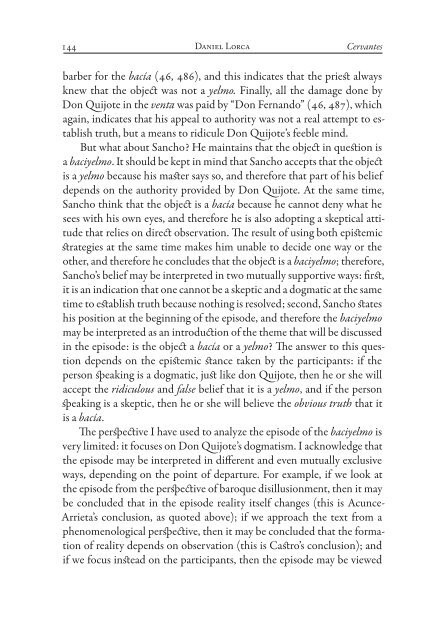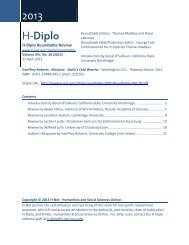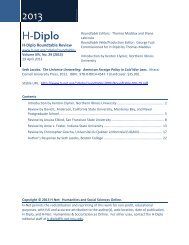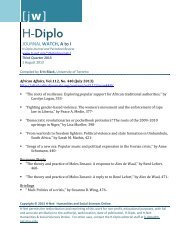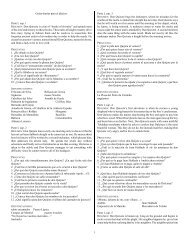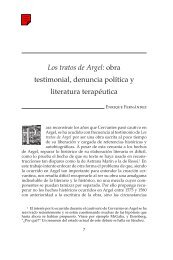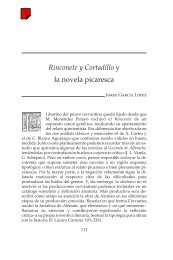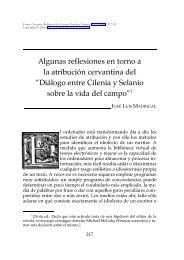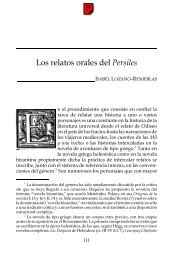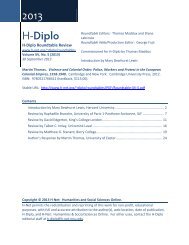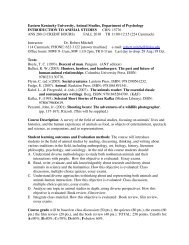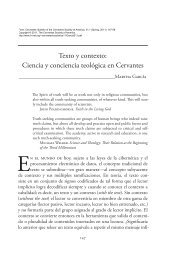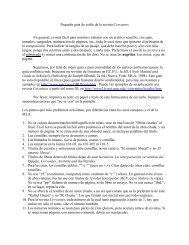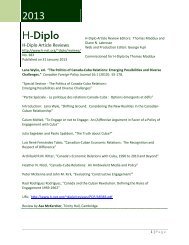The Function of Skepticism in Part I of Don Quijote - H-Net
The Function of Skepticism in Part I of Don Quijote - H-Net
The Function of Skepticism in Part I of Don Quijote - H-Net
Create successful ePaper yourself
Turn your PDF publications into a flip-book with our unique Google optimized e-Paper software.
144 Daniel Lorca<br />
Cervantes<br />
barber for the bacía (46, 486), and this <strong>in</strong>dicates that the priest always<br />
knew that the object was not a yelmo. F<strong>in</strong>ally, all the damage done by<br />
<strong>Don</strong> <strong>Quijote</strong> <strong>in</strong> the venta was paid by “<strong>Don</strong> Fernando” (46, 487), which<br />
aga<strong>in</strong>, <strong>in</strong>dicates that his appeal to authority was not a real attempt to establish<br />
truth, but a means to ridicule <strong>Don</strong> <strong>Quijote</strong>’s feeble m<strong>in</strong>d.<br />
But what about Sancho? He ma<strong>in</strong>ta<strong>in</strong>s that the object <strong>in</strong> question is<br />
a baciyelmo. It should be kept <strong>in</strong> m<strong>in</strong>d that Sancho accepts that the object<br />
is a yelmo because his master says so, and therefore that part <strong>of</strong> his belief<br />
depends on the authority provided by <strong>Don</strong> <strong>Quijote</strong>. At the same time,<br />
Sancho th<strong>in</strong>k that the object is a bacía because he cannot deny what he<br />
sees with his own eyes, and therefore he is also adopt<strong>in</strong>g a skeptical attitude<br />
that relies on direct observation. <strong>The</strong> result <strong>of</strong> us<strong>in</strong>g both epistemic<br />
strategies at the same time makes him unable to decide one way or the<br />
other, and therefore he concludes that the object is a baciyelmo; therefore,<br />
Sancho’s belief may be <strong>in</strong>terpreted <strong>in</strong> two mutually supportive ways: first,<br />
it is an <strong>in</strong>dication that one cannot be a skeptic and a dogmatic at the same<br />
time to establish truth because noth<strong>in</strong>g is resolved; second, Sancho states<br />
his position at the beg<strong>in</strong>n<strong>in</strong>g <strong>of</strong> the episode, and therefore the baciyelmo<br />
may be <strong>in</strong>terpreted as an <strong>in</strong>troduction <strong>of</strong> the theme that will be discussed<br />
<strong>in</strong> the episode: is the object a bacía or a yelmo? <strong>The</strong> answer to this question<br />
depends on the epistemic stance taken by the participants: if the<br />
person speak<strong>in</strong>g is a dogmatic, just like don <strong>Quijote</strong>, then he or she will<br />
accept the ridiculous and false belief that it is a yelmo, and if the person<br />
speak<strong>in</strong>g is a skeptic, then he or she will believe the obvious truth that it<br />
is a bacía.<br />
<strong>The</strong> perspective I have used to analyze the episode <strong>of</strong> the baciyelmo is<br />
very limited: it focuses on <strong>Don</strong> <strong>Quijote</strong>’s dogmatism. I acknowledge that<br />
the episode may be <strong>in</strong>terpreted <strong>in</strong> different and even mutually exclusive<br />
ways, depend<strong>in</strong>g on the po<strong>in</strong>t <strong>of</strong> departure. For example, if we look at<br />
the episode from the perspective <strong>of</strong> baroque disillusionment, then it may<br />
be concluded that <strong>in</strong> the episode reality itself changes (this is Acunce-<br />
Arrieta’s conclusion, as quoted above); if we approach the text from a<br />
phenomenological perspective, then it may be concluded that the formation<br />
<strong>of</strong> reality depends on observation (this is Castro’s conclusion); and<br />
if we focus <strong>in</strong>stead on the participants, then the episode may be viewed


